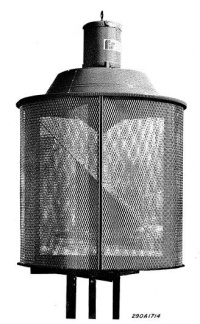Thunderbeam: Difference between revisions
Jump to navigation
Jump to search
(Added a Period) |
No edit summary |
||
| Line 6: | Line 6: | ||
|succeeded= [[2001SRN]] | |succeeded= [[2001SRN]] | ||
|manual= https://www.thesirenboard.com/manuals/rsh10.pdf | |manual= https://www.thesirenboard.com/manuals/rsh10.pdf | ||
|ports= 12 | |||
}} | }} | ||
The RSH-10, also known as the Thunderbeam, was a rotating electromechanical siren produced by [[Federal Signal Corporation]]. RSH stands for Rotating Single-Tone High. Its unusual design consists of a hornless [[STH-10]] mounted at the top with a slanted disc in a cage below. The housing directs sound downward from the rotor and stator, onto the disc. The disc is rotated using a gear reduction off of the rotor shaft, directing the sound in different directions | The RSH-10, also known as the Thunderbeam, was a rotating electromechanical siren produced by [[Federal Signal Corporation]]. RSH stands for Rotating Single-Tone High. Its unusual design consists of a hornless [[STH-10]] mounted at the top with a slanted disc in a cage below. The housing directs sound downward from the rotor and stator, onto the disc. The disc is rotated using a gear reduction off of the rotor shaft, directing the sound in different directions. | ||
[[Category:Rotating Sirens]] [[Category:Electromechanical Sirens]] [[Category:Federal Signal Corporation]][[Category:Single Toned Sirens]][[Category:Sirens]] | [[Category:Rotating Sirens]] [[Category:Electromechanical Sirens]] [[Category:Federal Signal Corporation]][[Category:Single Toned Sirens]][[Category:Sirens]] | ||
Revision as of 01:27, 16 October 2017
| Thunderbeam | |
[[File: |200px]] |200px]]
| |
| Company | Federal Signal Corporation |
|---|---|
| Type | Electromechanical |
| Sound output | 128 |
| Succeeded by | 2001SRN |
| Documentation | Manual |
The RSH-10, also known as the Thunderbeam, was a rotating electromechanical siren produced by Federal Signal Corporation. RSH stands for Rotating Single-Tone High. Its unusual design consists of a hornless STH-10 mounted at the top with a slanted disc in a cage below. The housing directs sound downward from the rotor and stator, onto the disc. The disc is rotated using a gear reduction off of the rotor shaft, directing the sound in different directions.